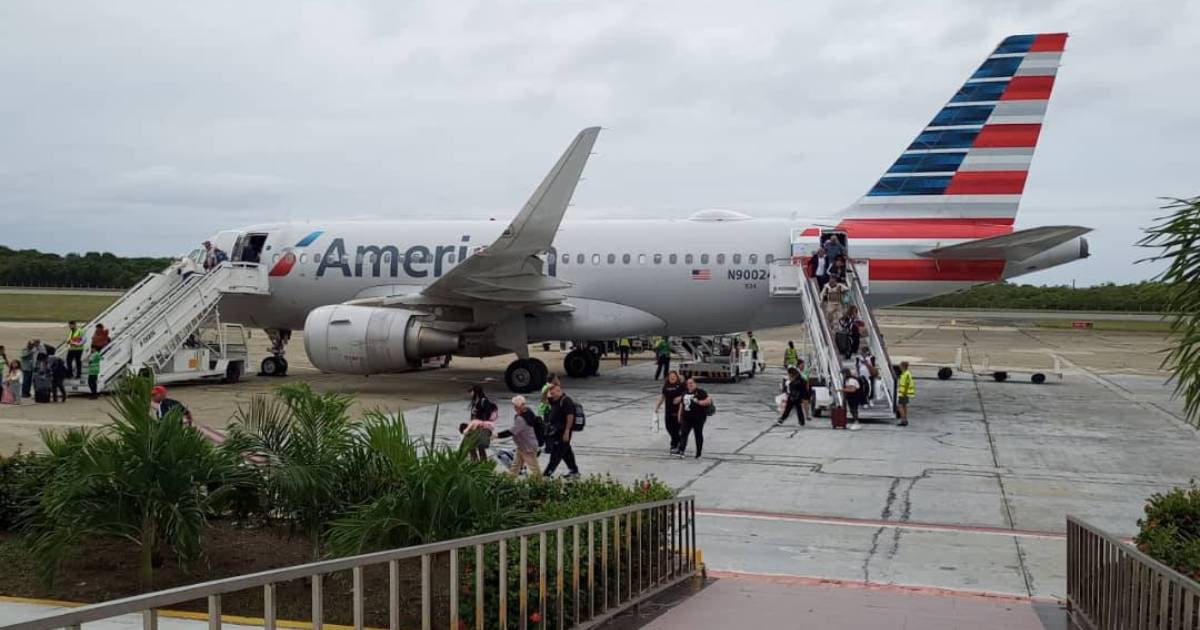American Airlines, a major U.S. carrier, has requested the U.S. Department of Transportation (DOT) to modify its current waiver to suspend several flights to Cuba temporarily. This includes the direct route between Miami and Santiago de Cuba. If the request is approved, the airline will cease operations to this eastern Cuban city for the remainder of the summer of 2025, according to a report from the aviation-focused outlet Airline Geeks.
This would leave Santiago without direct American Airlines connections to the United States, impacting many Cuban families divided by the Florida Straits. The Miami–Santiago de Cuba flight, launched in May 2019, marked the sixth Cuban destination for American Airlines. Its initiation was celebrated as an essential step in strengthening air links between Cuba and the United States, especially for eastern Cuban families who previously had to travel to Havana or Holguín to reunite with loved ones.
At the flight's inauguration, American Airlines executives and representatives from Santiago's Antonio Maceo International Airport emphasized their commitment to maintaining this route as a symbol of bilateral growth and understanding. However, just six years later, this promise might be put on hold.
American Airlines cites "persistent challenges in demand recovery" between the two countries as the reason for its decision, stating the need to better allocate its aircraft given current market conditions. This move is part of a broader request to also partially suspend some of its daily flights between Miami and Havana.
The airline also noted that it continues to hold an active waiver for flights to other Cuban airports, such as Camagüey, Holguín, Varadero, and Santa Clara, which will not be impacted for now.
The announcement comes amid a sensitive backdrop: President Donald Trump recently imposed new travel restrictions between the U.S. and Cuba, potentially influencing commercial airline decisions. While American Airlines described its request as "limited in scope" and temporary, for many Cuban residents in the U.S., especially those from the eastern region, this route is a crucial link to family and humanitarian support.
The potential suspension, even temporarily, adds uncertainty to an already complicated scenario for family reunification and humanitarian trips. As of now, the DOT has not issued a final decision.
President Trump signed an executive order on Wednesday, June 4, restricting U.S. entry for Cuban nationals holding B-1/B-2, F, M, and J visas, citing Cuba as a "state sponsor of terrorism" with a high visa overstay rate. Although this order does not explicitly ban flights, it threatens their economic viability. If Cubans are unable to enter the U.S. legally, ticket demand will drop, potentially forcing airlines to cancel routes, as was the case in 2023 with JetBlue and Delta.
With over 9,000 flights planned to Cuba this year, American Airlines is the most exposed airline. It operates flights from Miami to six Cuban cities, including Havana, Holguín, Santa Clara, Camagüey, Varadero, and, for the time being, Santiago de Cuba.
Implications of American Airlines' Flight Suspensions to Cuba
Why is American Airlines considering suspending flights to Santiago de Cuba?
American Airlines is considering suspending flights due to "persistent challenges in demand recovery" between the U.S. and Cuba, and the need to better allocate their aircraft under current market conditions.
How might the suspension affect Cuban families?
The suspension would remove a direct link between Santiago de Cuba and the United States, complicating travel for Cuban families divided by the Florida Straits, affecting reunification and humanitarian visits.
What other Cuban destinations does American Airlines serve?
American Airlines operates flights to six Cuban cities: Havana, Holguín, Santa Clara, Camagüey, Varadero, and Santiago de Cuba.
What impact do recent U.S. travel restrictions have on flights?
Recent U.S. travel restrictions, particularly those affecting visa holders, may reduce demand for flights, threatening the economic viability of certain routes and potentially leading to cancellations.
